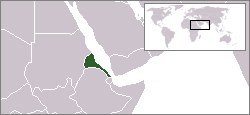The State of Eritrea is a country in North east Africa, bordered by Sudan in the west, Ethiopia in the south, and Djibouti in the southeast. The east and northeast of the country have an extensive coastline with the Red Sea. Having achieved independence on May 24, 1993 from Ethiopia after a long rebellion, it is one of the youngest independent states. Working languages include Tigrinya, Arabic, and English.
State of Eritrea Hagärä Ertra
ሃገረ ኤርትራ | |
|---|---|
| Motto: Never Kneel Down | |
| Anthem: Ertra, Ertra, Ertra | |
 | |
| Capital and largest city | Asmara |
| Official languages | (working, not official languages) Tigrinya, and English [1][2] |
| Government | Transitional government |
| Isaias Afewerki | |
| Independence From Ethiopia | |
• Limited | May 29, 1991 |
• Full | May 24, 1993 |
• Water (%) | Negligible |
| Population | |
• July 2005 estimate | 4,401,000 (118th) |
• 2002 census | 4,298,269 |
| GDP (PPP) | 2005 estimate |
• Total | $4.471 billion (162nd) |
• Per capita | $909 (177th) |
| HDI (2003) | 0.444 low (161st) |
| Currency | Nakfa (ERN) |
| Time zone | UTC+3 |
| Calling code | 291 |
| ISO 3166 code | ER |
| Internet TLD | .er |
History
Eritrean history is one of the longest of Africa and even the world. Together with Abyssinian (Today most part of Ethiopia) and the southeastern part of the Red Sea coast of Sudan, it is considered the most likely location of the land known to the ancient Egyptians as Punt (or "Ta Netjeru," meaning land of the Gods), whose first mention dates to the 25th century BC.
The modern name is the Italian form of the Greek name ΕΡΥΘΡΑΙΑ (Erythraîa; see also List of traditional Greek place names), which derives from the Greek name for the Red Sea (Ἐρυθρὰ Θάλασσα).
Pre-colonial era
Around the 8th century BC, a kingdom known as D'mt was established in northern Ethiopia and Eritrea, with its capital at Yeha in northern Ethiopia. Its successor, the Kingdom of Aksum, emerged around the 1st century AD and grew to be, according to Mani, one of the four greatest civilizations in the world, along with China, Persia, and Rome.
Eritrea's first experience with partial domination by a foreign power occurred in 1557, when an Ottoman invasion under Suleiman I conquered Massawa, Arkiko, and Debarwa the capital of Bahr negus Yeshaq. Yeshaq was able to retake much of what the Ottomans captured, but later revolted twice with Ottoman support. By 1578, all revolts had ended, with the Ottomans having domain over the important ports of Massawa and Hergigo and their environs, leaving the province (Habesh
